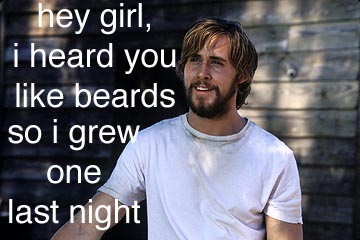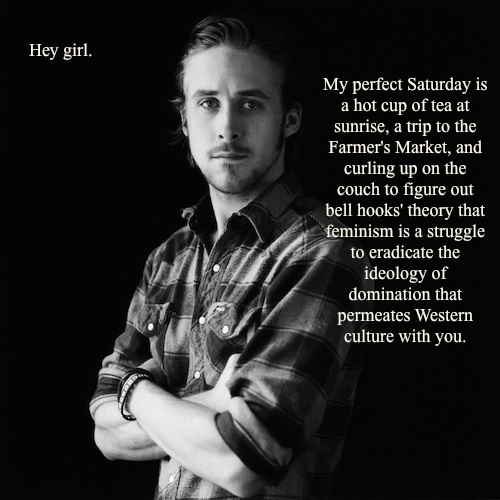Serendip is an independent site partnering with faculty at multiple colleges and universities around the world. Happy exploring!
"Hey Critical Feminist Studies..."
In late 2011, the “feminist Ryan Gosling” (FRG) meme became an overnight internet sensation. For those who haven’t heard of him, Ryan Gosling was already a presence in Hollywood, starring in movies such as “The Notebook,” “Half Nelson,” “Lars and the Real Girl” and “Blue Valentine” among others1. A blog2 had already been created which showed images of Gosling with captions meant to appeal to a heterosexual, female audience. These posts always start with “Hey girl…” and go on to show how lovable and sensitive the idealized Gosling is. Some examples are shown below. Feminist Ryan Gosling3 follows the same formula except that the text following “Hey girl…” contains some feminist idea or theory (examples of these are also included below). Given the multitude of content that can be found online, why did “Feminist Ryan Gosling” become so overwhelmingly popular, especially considering the lack of involvement the actual Ryan Gosling had (none of the captions are quotes) and what role does the blog play in the discussion of male feminism? Do we praise male feminists, and even those who are portrayed in some way to be feminist by outside voices, to an unreasonable degree (see rayj's post on another feminist tumblr and questions about praising male feminism)? What does this praise do for feminism? Are cultural expressions of feminism such as FRG oversimplifying feminist ideology and fetishizing male feminists, or are they making feminism accessible and sparking the public’s interest about feminist issues and theory?

The original Ryan Gosling meme


Feminist Ryan Gosling memes
“Feminist Ryan Gosling” was created by a graduate student in the Gender Studies department at the University of Wisconsin. She started the blog in order to make flashcards that would help her remember the theory she was learning and teaching about, and did not expect that it would go viral. In an interview on sheposts.com[4], the author gives a timeline of the blog’s success. She says that she created several images and posted them on a Friday night, and by Saturday (October 8th, 2011), the blog was picked up by Jezebel5, a popular site that helped the meme go viral. In fact, it went so viral that Time Magazine online chose it as its “Tumblr of the Week” on October 11th, 20116. The author writes in the FAQ section of her blog that the irony of starting her posts about feminism with “Hey girl” is not lost on her. Neither is the fact that she is using the image of a white, wealthy male whom society and Hollywood has deemed attractive in order to give voice to her posts. The creator of FRG thinks that these ironic features make the blog funnier and add some humor to feminism, an ideology which she believes can often be thought of as too serious. In addition to Jezebel and Time, The Huffington Post7, Ms. Magazine and Feministing.com have reported on the meme, and despite the fact that some might view FRG as a controversy in regards to its representation of feminism and male feminism, it is almost impossible to find criticism of the phenomenon. In fact, the interesting web comic8 shown below is the only critique that can be found within the first few pages of a Google search of “criticism feminist Ryan Gosling.” Why is this meme so able to escape negative attention?

A comic questioning the praise of FRG
On one hand, FRG adds to the objectification of men and could serve to trivialize the legitimacy of feminism. It clearly recognizes that many may find Gosling attractive and uses his famed sex appeal in order to juxtapose him against feminist theory. While the juxtaposition is often humorous, it idealizes the idea of a male feminist. The response garnered by the images puts forth the idea that a man can be more attractive to women by siding with feminist ideology. The fact that Gosling himself has gotten some attention for this blog, and has been portrayed as a feminist by the media due to his appearance in these memes, along with some actual remarks he made about the inequality in film ratings given to depictions of male and female sexual experiences and descriptions of his upbringing with a single mother7, is confusing. Few, if any, feminist theorists gain mass media attention and awareness, so how does a Hollywood heartthrob gain acclaim among women, for a blog that he did not create, with theories he has never endorsed? Several articles about the FRG blog say things such as, “A huge fan of Ryan Gosling myself, Henderson’s playful Tumblr makes my heart swoon even more for this past Mickey Mouse Club member whether or not he truly is feminist. But hey, a girl can dream right?”9 This type of swooning over Gosling, and noting how wonderful it would be if he were feminist could be harmful to actual feminist work. As we discussed in class, to laud somebody, especially a male, for being feminist is akin to applauding someone’s belief in human rights – it seems like it should be a given, not a quality that we need to reinforce through praise.
On the other hand, is any public attention paid to the cause of feminism valuable? The creator of FRG has mentioned in her interviews that she often receives comments and emails asking about the specific theories she explores through her images. Individuals may at first find the site funny and charming, but later wonder about the feminist ideas discussed and may even go looking for other sources to educate themselves with. Is using a male such as Ryan Gosling, while discussing feminism still feminist, or is it reinforcing a patriarchy in which white men are praised and bolstered up? FRG takes praising male feminists to an extreme, with media and individuals giving positive attention to a male solely for having feminist theory typed on top of his photograph. However, if FRG is producing any productive discourse on feminism (which by evidence of this paper, it probably is), it may be a useful tool to educate people. I searched for “feminist ryan gosling” and “feministryangosling” on twitter[2] and Tumblr[3] to see if people are still talking about the meme, and found 100s of results in just the past few days – clearly the discussion is still alive and growing. The tweets and comments range from notes on Gosling being attractive in the FRG posts, to links to articles about Gosling and his possible real-life feminist tendencies, to people discussing the theory shown in the posts. One Tumblr post led me to find that the FRG blog comes up on the first page of a Google search of “feminist” (and is the first item that comes up when Google tries to auto-complete a search of “feminist”) and “feminism.” Whether it is feminist or not, FRG is certainly being heavily connected to feminism online, and the internet is probably the most utilized source of self-education. At a time when many people get their news from sources like twitter and the Colbert Report, online memes are likely generating more conversation than more traditionally academic sources.
Considering all of the press FRG has gotten, I think feminism has become a little more accessible to the mainstream. Feminist theory can be dense, and seeing it as a humorous meme brings a little levity to the conversation12. Although the density present in feminist theory is at times necessary in order to explain the nuances of feminism and the subjugation of women, an interjection of humor (for more thoughts on feminist humor, see michelle.lee's post on the subject) can ease the discussion. If the conversation can be more easily understood and accessed, feminism can gain new life with younger people (see Amophrast's notes on Jack Halberstam's talk at Bryn Mawr and ideas about "low theory"). Although Gosling does get a lot of attention because of his presence in internet memes, including FRG, so does feminist theory, which would otherwise not be discussed by the demographic memes are popular with.
FRG, taken on face value has many problematic aspects. Using an individual to stand for a cause, when that individual has no affiliation with the cause is fairly strange, and using a male icon to represent feminist thinkers is even more bizarre. Simplistically, feminism is traditionally about marginalized groups, so using Ryan Gosling to represent the cause seems strange, until one realizes that using a figure such as Ryan Gosling could just be another example of the influence of the patriarchy. However, this peculiar combination has brought conversation about feminism to pop culture, and therefore deserves consideration and serious thought.
Having given my opinion, I now ask the reader to look at this popular representation of feminism and the attention it has garnered. Is this attention solely for Ryan Gosling, or is some of it given to feminism as a cause? Is Gosling being praised, or is the female creator of the FRG blog being applauded? Does FRG bring feminism to the attention of those who may otherwise have never considered its goals and ideals or does it shed a patriarchical, and therefore flawed, light on feminism? What would feminist Ryan Gosling say? We know it would start with “Hey girl…”
1 Ryan Gosling. Imdb, the internet movie database. Retrieved from http://www.imdb.com/name/nm0331516/
3 Henderson, D. http://feministryangosling.tumblr.com/
4 Howerton, K. (2011, November 01). Retrieved from http://sheposts.com/content/interview-with-feminist-ryan-gosling-author-danielle-henderson
5 Moore, L. (2011, October 08). Retrieved from http://jezebel.com/5847935/feminist-ryan-gosling-flashcards-will-cure-what-ails-you-girl
6 Gibson, M. (2011, October 11). Retrieved from http://newsfeed.time.com/2011/10/11/tumblr-of-the-week-feminist-ryan-gosling/
7 (2011, October 10). Retrieved from http://www.huffingtonpost.com/2011/10/10/feminist-ryan-gosling-blog_n_1004158.html
9 (2012, January 14). Retrieved from http://feministing.com/2012/01/14/the-feministing-five-danielle-henderson/
12 Henderson, D. (2012). Retrieved from http://www.uwalumni.com/home/gws12_mafeature.aspx



Comments
FRG
Hi
Thanks for this critique, I really enjoyed it and it resonated with me. I have always felt a bit uncomfortable with FRG, after my initial guffaws, of course!
I wanted to point out however that Ryan Gosling doesn't come up in Googles autofill after you type Feminist - it is just that your computer has remembered that you typed that once. I wanted to mention this as that was the bit that scared me the most in the above! However, when I type feminist, I get auto fill words such as Theory/ Studies/ Critique etc. Phew!
Thanks again!
"A girl can dream, right?"
epeck--
As you (all) know by now, I'm not a big user-or-fan of popular culture; many of our "setting the scene" conversations were painful to me. The multiple ways in which pop culture fails to nudge us beyond current unsustainable and inequitable practices, well...
I'm a little tired of that conversation.
But you've got me re-thinking my position here. A student who attended the Re:Humanities Conference @ Swat last month reported that the final conversation there involved an hilarious stand-off between the (Marxist) professors, who were outraged @ the use of advertisements on the internet, a site they want to be free of commercialization, and the (media-savvy) undergrads, who saw advertisement as "part of life," and felt untrammeled by it in their exploration of the possibilities opened for themselves on the internet.
I'm viewing your project here in light of that conversation. Sure: "making" Ryan Gosling "into" a feminist --"using a male icon to represent feminist thinkers"--is somewhat "bizarre" and intensely problematic, for all the reasons you catalogue. And taking advantage of Ryan Gosling's star power to promulgate some complicated theory--a delight to hear that this meme began as grad school flash cards (in fact, this story is so delightful I'm not sure I believe it!)--says something deep about how we learn new things: by attaching them to old ones, to things we value and remember. So this (admittedly problematic!) mode also has enormous possibilities...
as you also recognize, in "bringing conversation about feminism to pop culture," particularly in the current climate in which "the internet is probably the most utilized source of self-education." (Speaking of which: I'm very glad to see the degree to which you are drawing on the work of your peers--rayj's reflections on male feminism, for example, as well as michelle.lee's on feminist humor and amophrast's on "low theory." Now that's feminism!)
My own series of concluding questions are a little more pointed and particular--and future-oriented?-- than yours: what are the next steps in giving these FRG memes "consideration and serious thought"? For instance, what would a "grown-up" male feminism look and sound like? What new fantasies might we offer budding feminists? How about beginning with Tom Digby's collection of Men Doing Feminism? And figuring out a way to popularize these ideas...? Starting with "Hey, woman...."? Or "Hey, human..."?
Sorry for the giant comic, I
Sorry for the giant comic, I wasn't sure how to resize it (but at least it's readable!).
I like the giant comic!
I like the giant comic!